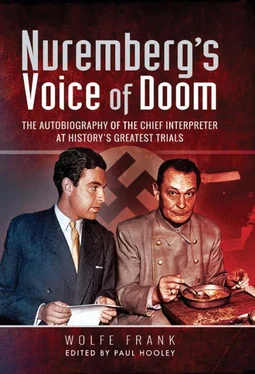I was told I would be serving in some sort of labour corps, and I had no intention of remaining in it. Once out of internment, I resolved, I would continue my efforts to join a combatant unit.
On the 18 December 1940, I appeared before a recruiting officer and was sworn in. I was paid half-a-crown (twelve and a half pence in today’s money) per day and I was a soldier.
The following morning the gates of the camp were opened for ten of us and we were free – or so we thought!
We got off to a nice, wrong start. Aboard the ship taking us to Liverpool we discovered that we were under escort. This made me angry and I stayed angry all the way across. At Liverpool we were received by an officer who had orders to take us to a transit barracks. I sat down on my suitcase and informed him that I wasn’t going anywhere – this rather horrified my comrades.
I then informed the officer that we had been sworn in as members of HM Forces and were, as he might realise, now privates in the same army in which he was an officer. We could not therefore be internees at the same time. We had not committed a breach of any regulations, so there was no justification for an escort. If he couldn’t send that escort off himself, he had better get hold of someone in authority that could.
The officer took my speech rather well and saw my point and we set off towards the barracks – not escorted, but ‘guided’ by a soldier who had travelled with us – where I got a look at our movement orders. These referred to us as being, ‘One other rank (OR) and ten internees.’
I went on strike again and I was taken to see the officer in charge, to who I repeated my argument. He too was very sensible and not only altered the movement orders but also gave us the next twenty-four hours off; in spite of the orders stating ‘confined to barracks’.
So, the time had come to mix with ‘free’ people again. I walked out of the barracks and into Liverpool a free man – six months had passed since the egg warmer incident in Wokingham police station.
I had wondered if it would take long to get used to that freedom. In actual fact, it took less than five minutes to return to normal; at least as far as meeting people, ordering a meal and latching on to an acquiescent young lady was concerned. Psychologically, though, the effects of spending six months behind barbed wire did not wear off for as many months.
I spent that day lunching at a hotel, going to a cinema, then to a show and finally to a dance hall where holding a girl in my arms after six months of total abstinence was a most unbalancing experience. When I finally adjourned to the apartment of the consenting, adult female I felt exceedingly nervous, but what’s natural comes back naturally.
We, the latest additions to the British Army, set off for Ilfracombe in Devon the following evening. On the way to the station our party was caught up in a hell of an air raid. In those days Goering’s bombers were having it all their own way and Liverpool, on 21 December 1940, experienced the worst air-raid it ever had. [6] Referred to as the Christmas Blitz, 365 people were killed in Liverpool between 20 and 22 December 1940.
We were hugging the buildings as shrapnel fragments flew around us and every pane of the station’s glass roof was totally shattered. Since that was the first raid I had ever experienced it was all quite frightening. (Later, in London, raids became a routine affair.) Our train was four hours late when it finally steamed into Liverpool and lost another three hours on its journey to Devon.
In order to be fair to the Army I ought to describe the condition I arrived in at the Ilfracombe training centre. I had taken only one suit of clothes with me when I was arrested in June. I had slept in it for many nights at the Warth Mill and Peel internment camps and I had never quite succeeded in restoring it to its former respectable self. Over this suit I was wearing a camel hair coat and I carried a rather expensive looking rawhide suitcase.
Worst of all was the state of my hair. The camp barber at Peel had been released at a time when my haircut was already overdue. The first sergeant major to see me when I arrived at Ilfracombe nearly suffered a heart attack. ‘Blimey,’ he said ‘wot’s this? Jesus Christ,’ followed by, ‘haircut, you!’ So, before anything else, I went off to the barber and had what is known as a ‘pudding basin’ – which derives its name from the legend that the barber places a pudding basin on the victim’s head and cuts off all the hair showing below it. In my case the man did extremely well without the basin and I saw a stranger in the first mirror I came to.
Then I received my uniforms, two of them. We filed along a counter and picked up boots, socks, shirts, underwear, gaiters, haver-sacks and, finally, two battle blouses [7] In the British Army a blouse was a short jacket made of wool serge that buttoned to the outside of high-waisted wool serge trousers.
and trousers. A corporal had a look at me and threw the garments on the counter. ‘Are you sure they’re my size,’ I enquired naively. ‘Sure I’m sure’ came the reply. ‘We never make mistakes’.
I had received two suits of different sizes and made of different material and for several months afterwards I had the choice of the following outfits:
1. Blouse and trousers of the same material, trousers ridiculously small, blouse too large.
2. Blouse and trousers of the same material, trousers far too large, blouse too small.
3. Blouse and trousers of different material, both far too large
4. Blouse and trousers of different material, both far too small.
We gallant fighting men of the AMPC were quite a sight, particularly if we donned our overcoats (called greatcoats) that made our resemblance to a potato sack complete.
The seven days I spent in Ilfracombe were fairly evenly divided between hanging about aimlessly, kitchen fatigue and a little foot drill. I let Hitler have it right there and then by washing, in tepid water, 4,000 tin plates in one day!
Our status was clarified a little more during those first few days. The Unit would have British officers and aliens could hold NCO ranks up to quartermaster and staff sergeant. We were to remain unarmed but would get the same amount of leave as any other soldier. However before going on leave we would be required to state the address to which we were going and, once there, report to the local police. This last regulation was soon dropped.
We moved out of Ilfracombe on the 29 December. Those seven days represented the total basic training we received. We had a vague idea of how to salute and stand to attention. As for the rest, we were terrible. We marched like no uniformed body of men had ever marched before, which must have broken the hearts of the NCOs, some of whom had actually been transferred to the AMPC from Guards regiments.
Before we departed for the station there had been a speech given by the commanding officer. We were, he told us, ‘Going out to do a very special job of the very greatest importance’. This turned out to be carrying flour and potato sacks.
We were moved to Catterick [8] Catterick is the largest British Army garrison in the world.
in Yorkshire as 240 Company, AMPC. There we were split into sections and sent off to our various duties in small detachments. My section was attached to a Company of the Royal Army Service Corps (RASC), which was operating a Command Supply Depot in West Auckland, where we got on splendidly with both officers and the rank and file. With our own officers and NCOs the situation was slightly different for several reasons.
In those days the Pioneer Corps (PC) was the most unpopular unit in the Army. Its members included men who were too old or unfit to serve in fighting units and men released from jail on the condition they volunteered for military service. There were also so called ‘Q’ or ‘Queer’ companies that, in those days, meant those men released from mental institutions. Finally, there were we former enemy aliens.
Читать дальше












